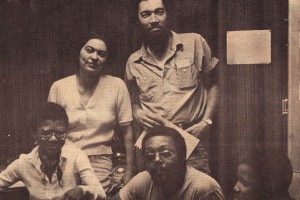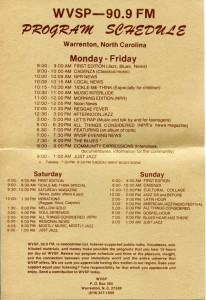Assistant professor of digital humanities Seth Kotch doesn’t think textbooks give a full picture of the civil rights era.
“We learn about the civil rights movement through Martin Luther King Jr. and Malcolm X, but the vast majority of people in the movement were experiencing it in very different ways,” he said. “But what happened to the civil rights story in N.C. and in the South after the mainstream media stopped paying attention to it?”
Through his Media and the Movement project, Kotch hopes to provide a glimpse into the experiences of everyday people and activists from the civil rights era. In collaboration with researchers at Duke University, Kotch is creating a digital archive of broadcasts from black activist radio stations from the 1960s and ’70s.

WVSP staff in 1977
“People started these stations because they thought media offerings for people like them were spare,” Kotch said. “We want to know what the experience was for the young person sitting up at night with a headpiece in so they don’t wake their parents up. What was the experience of someone watching one of these shows being broadcast live?”
Kotch has collected over 150 audio reels from radio stations across the United States. He received a $28,000 grant from the National Endowment for the Humanities to digitize the reels and create an online archive.
“This project at its heart really is an oral history project,” Kotch said. “We’ve conducted interviews with almost 60 founders, owners, broadcasters, deejays, editors, reporters and others who worked on all these outlets.”
WAFR in Durham and WVSP in Warren County, northeast of Raleigh, were two pioneering stations that did more than just broadcast, said Kotch; they provided a sanctuary for community members to seek out social services.
 “WVSP became a site for job training when there wasn’t job training for people in the area; it became a site for after-school care when there wasn’t after-school care offered by the schools there. It was much more than a broadcaster sending messages … It was a real community center, of community-oriented activism that had a real impact on people’s lives.”
“WVSP became a site for job training when there wasn’t job training for people in the area; it became a site for after-school care when there wasn’t after-school care offered by the schools there. It was much more than a broadcaster sending messages … It was a real community center, of community-oriented activism that had a real impact on people’s lives.”
Running these stations was a labor of love, he said. Most were nonprofit and fought hard to stay financially afloat. One way stations cut costs was by taping broadcasts on reel donated from organizations like National Public Radio.
“A lot of the reel has been recorded over, so we don’t know what’s on these tapes or when they’re from,” he said. “But some of the reels were labeled. When you label something, there’s a sense that thing will endure.”
Kotch is working with the Digital Innovation Lab to create an interactive database to give the public access to radio broadcasts, oral histories and scholarly texts about the civil rights movement. The archive is expected to be completed in the fall.
“Our project for the next six months is to just listen,” Kotch said. “It’s a great opportunity to immerse ourselves in history and we can do the equivalent of closing our eyes and just listening, like the kid sitting on his bed listening to the station he’s not supposed to be listening to in Raleigh in 1975.”
Story by Parth Shah ’15, video by Kristen Chavez ’13
